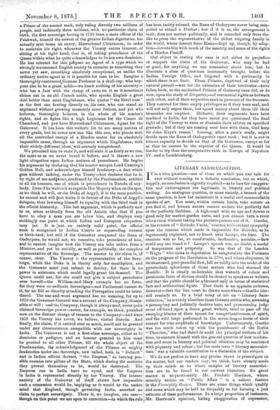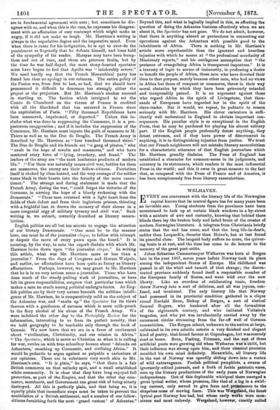LITERARY SAN SC ULOTTISM.
I T is a nice question—one of those on which you can talk for ever without coming to a definite conclusion, but on which, happily, no conclusion is urgently required—as to how far exaggera- tion and extravagance are legitimate in literary and political writing. An analogous question, or more strictly, a branch of the same question, is how far caricature is a useful and commendable species of art. You must, within certain limits, take nature as you find it, and human nature cannot endure the perfectly flat or the perfectly faultless. A high-road with no ups and downs is good only for market-garden carts, and you cannot turn a river into a canal without taking the picturesqueness out of it. Goethe, in his version of " Reineke Fuchs," touches with evident sympathy upon the reasons which made it impossible for Reineke, as he ingenuously explained, not to knock over Lampe, the hare. The creature was so fat, so comfortable, inoffensive, amiable,—how could any one stand it ? Lampe's speech was, no doubt, a model of temperance and propriety. So was that of the London " Wighs " who came in deputation to congratulate the Parisians on the progress of the Revolution in 1790, and whose eloquence, in its chastened, post-prandial flow, fell so coldly into the midst of the pyrotechnic splendours of those orators who had stormed the Bastille. It is clearly undesirable that warmth of colour and passionate force of diction should be denied to speakers or writers, and that the public should be addressed only in terms of statistical fact and arithmetical figure. That there is an opposite extreme, however—that the line must be drawn somewhere—Goethe him- self reminds us. In a brief essay of his on "Literary Sans- culottism," he severely chastises those German critics who, assuming a peremptory and judidially decisive tone, and pronouncing judg- ment off-hand upon a dozen great writers, tried to pass off the sweeping bluster of their speech for comprehensiveness of spirit, and the wild leaps performed in the seven-league boots of their conceit for true amplitude of knowledge. Unfortunately, Goethe was too much taken up with the punishment of the Berlin " Thersites," who had dared to scold the principal authors of his time, to concern himself with the general question of how modera- tion and sense in literary and political criticism may be combined with piquancy and colour ; but the mere term "literary sanscolot- tism " was a valuable contribution to a discussion of the subject.
We do not profess to have any precise views to promulgate on the matter, but our readers may, we think, have already made up their minds as to where samples of literary sansculot- tism are to be found in our current literature Its great master is unquestionably Mr. Frederic Harrison, whose monthly article on "Public Affair " is a salient feature in the Fortnightly Review. There are some things which qualify and some which may be held to disqualify us for forming a just estimate of these performances. In a large proportion of instances, Mr. Harrison's opinions, bating exaggeration of expression,
are in fundamental agreement with ours ; but sometimes he dis- agrees with us, and when this is the case, he expresses his disagree- ment with an affectation of easy contempt which might make us angry, if it did not make us laugh. Mr. Harrison's writing is always in the superlative degree and the imperative mood. Even when there is cause for his indignation, he is apt to over-do the punishment so flagrantly that he defeats himself, and loses bold of the sympathy of his reader. Marsyas may have been bump- tious and out of tune, and these are grievous faults, but by the time he was half-flayed, the most stony-hearted spectator must have begun to feel that Apollo was "intolerably severe." We need hardly say that the French Monarchical party has found less than no apology in our columns. The entire policy of the Fusion was, from first to last, so bad, that we should have pronounced it difficult to denounce too strongly either the project or the projectors. But Mr. Harrison's strokes succeed in startling us. The faction which intrigued to set the Comte de Chambord on the throne of France is credited with all the bloodshed that has occurred in France since the capitulation of Paris. "Fifty thousand Republicans have
been massacred, imprisoned, or deported." Unless this in- cludes what was done in suppressing the Commune, it is a pre- posterous exaggeration ; and if it includes the suppression of the Commune, Mr. Harrison must impute the guilt of massacre to M. Thiers as well as to the Due de Broglie. The French Army is described by Mr. Harrison as " four hundred thousand sbirri." The Due de Broglie and his friends are "a gang of pirates," who "exult in the hope of revolts and massacres," and who have mastered every form of "lying, treachery, and fraud." The leaders of the army are "the most loathsome products of modern life." ," For them war naturally means civil war, battles for them are massacres, the enemy are their fellow-citizens. Patriotism itself is choked by class-hatred, and the very courage of the soldier turns black in their hearts into the ferocity of the mere execu- tioner." The strange and daring statement is made that the French Army, during the war, "could forget the victories of the Germans, in nursing the hope of a bloody reckoning with the Democrats." "These men returned with a light heart from the fields of their defeat and from their inglorious prisons, thirsting with a frightful lust to drown the memory of their shame in a more congenial orgy of military tyranny and civil war." Such writing is, we submit, correctly described as literary sanscu- lottism.
English politics are all but too minute to engage the attention of our literary Drawcansir. "One must be to the manner born, one must be of the journalist claque, to follow with triumph or despair the move of every pawn upon the board." It is amusing, by the way, to note the superb disdain with which Mr. Harrison looks down upon "the journalist claque." In writing this article, what was Mr. Harrison more or less than a journalist ? From the days of Congreve and Horace Walpole, and earlier, no affectations have been quite so funny as literary affectations. Perhaps, however, we may grant to Mr. Harrison that he is in no very serious sense a journalist. Those who have done much of the steady-pulling work of journalism, or have felt its grave responsibilities, outgrow that particular tone which makes a man an oracle among political undergraduates. As Eng- lish politics are by their very nature beneath the sublime intelli- gence of Mr. Harrison, he is comparatively mild on the subject of the Ashantee war, and "snubs up" the Spectator for its views thereon with a gentleness of sarcasm which is mere milk-punch to the fiery alcohol of his abuse of the French Army. We were indebted the other day to the Fortnightly Review for the information, interesting to us from its perfect novelty, that we held geography to be teachable only through the book of Genesis. We now learn that we are in a fever of excitement about "civilisation, Christianity, and our mission in Africa." "The Spectator, which is never so Christian as when it is calling for war, rattles on with true schoolboy bounce about delenda eat Ashanteea,' smashing up Coornassie, and civilising Africa." it would be pedantic to argue against so palpable a caricature of our opinions. These are in substance very much akin to Mr. Harrison's own. "It is plain," he says, "that there is a fair British commerce on that unlucky spot, and a small established white community. It is clear that they have long enjoyed full protection, as part of the Empire, and that the other day com- merce, merchants, and Government ran great risk of being utterly destroyed. All this is perfectly plain, and that being so, it is equally plain that immediate steps must be taken to prevent the annihilation of a British settlement, and a number of our fellow- citizens furnishing forth the next grand custom' of Ashantee." Beyond this, and what is logically implied in this, as affecting the question of doing the Ashantee business effectively when we are about it, the Spectator has not gone. We do not admit, however, that there is anything absurd or pretentious in connecting our operations against the Ashantees with possible good to the
inhabitants of Africa. There is nothing in Mr. Harrison's article more reprehensible than the ignorant and heartless injustice with which he sneers at "the professional mendacity of Missionary reports," and his outfageous assumption that "the pretence of evangelising Africa is transparent imposture." It is a travesty of logic to accuse of insincerity, in professing a desire to benefit the people of Africa, those men who have devoted their lives to that purpose, merely because other men, who had no views in Africa but those of conquest or commerce, threw in their way moral obstacles by which they have been grievously retarded and inexpressibly pained. It is no argument against those who regard Africa in the spirit of Livingstone, that thou- sands of Europeans have regarded her in the spirit of the slave-trader. But it would, we repeat, be pedantic to reason seriously with Mr. Harrison. His clever caricature is suffi- ciently well understood in England to obviate important con- sequences. His peculiar style is so exceptional in the English Press, that he may be pardoned for playing his almost solitary part. If the English people profoundly detest anything, they detest extremes, and if they have power of discernment in anything, it is in distinguishing injustice from justice. We trust that our French neighbours will not mistake literary sansculottism for a characteristic utterance of that English journalism which Mr. Harrison grandly disdains. The Press of England has established a character for common-sense in its judgments, and accuracy in its statements, which renders it the most influential Press in the world ; and this it owes in great measure to the fact that, as compared with the Press of France and of America, it has been conspicuously free from literary sansculottism.



































 Previous page
Previous page